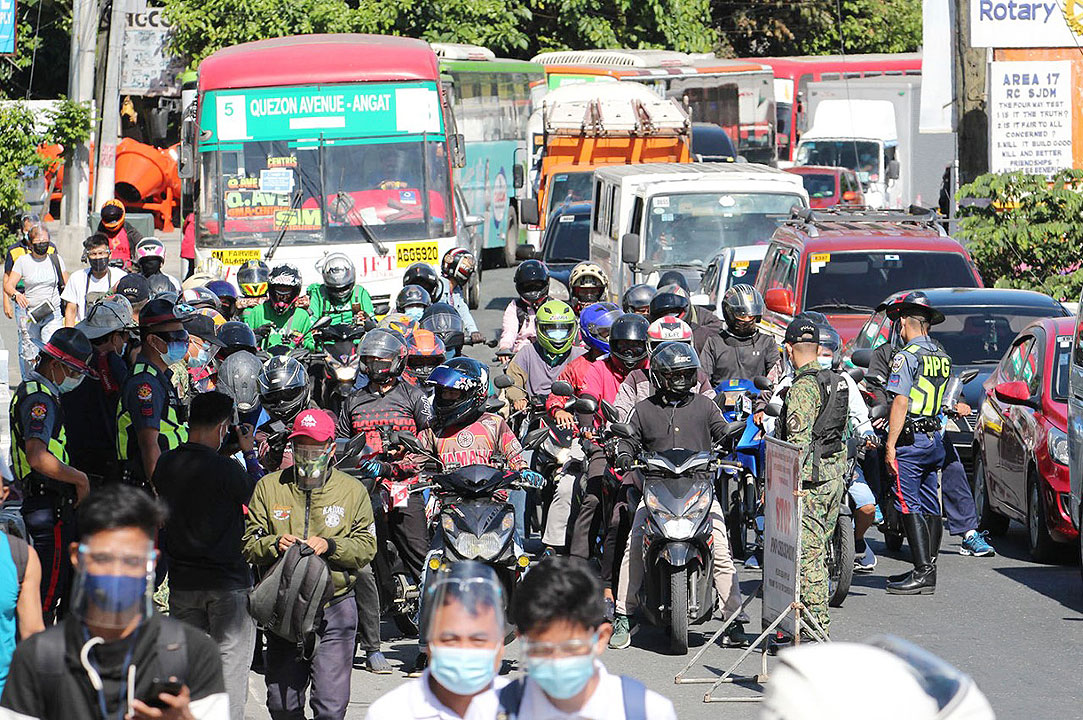Health professionals weigh in on what it will take to end lockdowns

By Alyssa Nicole O. Tan
THE PHILIPPINES should ensure risk mitigation, adhere strictly to health protocols, improve air quality, and enhance contact tracing to successfully end pandemic-related restrictions without worries of another surge, said health professionals, after political leaders called for an end to lockdowns in 2022.
“We need to reopen properly in order to avert another lockdown,” said Aileen R. Espina, co-convenor and steering committee member of the Healthcare Professionals Alliance Against COVID-19’s (HPAAC), via call on Saturday.
“If we put all of these solutions in place, the probability of a surge, like the ones experienced in the past, is low.”
The Philippines had one of the longest and strictest lockdowns in the world, which has taken a toll on the economy and growth prospects. The government has eased restrictions this fourth quarter, starting in the capital Metro Manila.
By strictly adhering to the policies and protocols well defined by professionals, the risk can be properly mitigated, Ms. Espina said, noting the “3Cs” that refer to enclosed spaces, crowded spaces, and close contact.
“Our situation is different from those (first-world) countries, so it’s not easy to say that we’ll just open,” said Private Hospitals Association of the Philippines (PHAPi) President Jose Rene de Grano via call on Friday.
“Our people are sometimes so hard-headed, they don’t want to follow directions and health protocols,” he said, noting as well the issue of anti-vaxxers.
Mr. de Grano said based on current norms, lockdowns should continue until the country has attained herd immunity.
As of Oct. 26, the Philippines has administered more than 56.2 million doses of COVID-19, according to the national task force against COVID-19 (coronavirus disease 2019).
Almost 26 million individuals have been fully vaccinated, comprising 34% of the country’s 70% target by yearend.
Mr. de Grano added, however, that lockdowns may no longer be necessary if the number of coronavirus cases continue to go down and is maintained, alongside a continuing vaccination rollout and adherence to minimum health protocols.
Ms. Espina also recommended the use of carbon dioxide monitors to enhance air quality and air circulation, which authorities can tap for monitoring crowded areas and take necessary action on.
Senator Panfilo M. Lacson, who is running for the top seat in the 2022 May elections, earlier said that if elected, he will end lockdowns that have “crippled the economy but failed to stop or even slow down the spread of COVID-19.”
In a forum Saturday, Mr. Lacson said the country can no longer afford another day of “on-off, off-on” lockdowns.
He cited the National Economic and Development Authority’s assessment that the present and future costs of COVID-19 and quarantines are estimated at P41.4 trillion. In 2020 alone, he added, the country lost P4.3 trillion.
In Metro Manila, the country’s capital and economic center, P20.5 billion was lost per day under the strictest quarantine classification, he said.
MENTAL HEALTH
Nonetheless, both doctors warned the public not to be complacent just because the number of cases have recently dropped.
“If we look at the global trend, it is rising once again, that is how pandemics and endemics behave; they will have downtimes then it will rise again,” said Ms. Espina.
“We have to be very careful, until such time that it is completely zero, that’s the only time that we can relax fully,” said Mr. de Grano in a mix of English and Filipino.
The challenge, Ms. Espina said, is nipping the problem in the bud before it spreads. “The goal, if there is a new variant, is to make sure that it doesn’t spread too much, and the way to do that is through contact tracing.”
Ms. Espina also said people should adapt a “hybrid lifestyle” to limit the “time of interaction with other people outside of your bubble.”
Vaccination, Mr. de Grano stressed, is key to achieving a balance between the people’s need to “go out” for mental wellness and keeping safe from the virus.
At least 3.6 million Filipinos suffer from one kind of mental, neurological, or substance use disorder, the Health department earlier said, citing a study by the World Health Organization.
“HPAAC is more than willing to sit down with any political group, with any presidentiable, to help them craft their health agenda in the new normal,” she added. “We are offering our services for that.”



